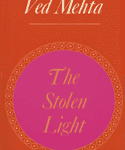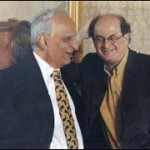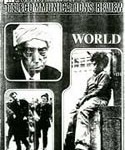It’s the Age of McDonald’s: Interview with Sheela Reddy
When you started out to be a writer, it must have been even tougher than it possibly was for V.S.Naipaul, given your blindness…
Actually, I never decided to be a writer. I’m still not sure that I’m a writer because writing is not something like medicine—you learn and say, Ah, now I’m a top doctor. Writing is a lifetime of apprenticeship…I never decided to be a writer, I just drifted into it. I had no money…. no bank…one book led to writing the next…. In any case, the way Naipul formulates his life is very different from the way I think of my life. I don’t think [of] myself as important. I just think I have a knack for writing and I do it. But I don’t have overweening ideas about what writers are, what they should be and what place they have in society. Nor do I worry much about who reads me—I write just for myself. I am the ideal audience.
Then why do you publish it all? Why don’t you just keep a journal?
Well, I hope that what I like, other people would like. Oh, I would love to have lots of readers. But, I don’t set out to please readers. I really dare to please myself. Oh no, I am thrilled when people read my book, or are interested or get reviews and so on. But when I am writing I don’t think of the audience… I have never written a book where I wasn’t involved in the subject.
Do you find a vast change in the way Indian English writers are regarded in the West since your times?
Well, there have been some very good Indian writers. And, by the way, I was surprised that some of them weren’t there (at the International Indian Literary Festival). I think Anita Desai is a marvelous writer, and she wasn’t there at the conference. Obviously, Salman Rushdie wasn’t there, who I think was invited. Arundhati Roy, who I think is the best writer to come out of India since Vikram (Seth)… wasn’t there. Some of the other people whom I won’t name who write in English, I think are indifferent writers, and no one would take any notice of them were they not Indians. You know, there are 50,000 books published in a year in America. They need 25,000 novels. And the only reason these people… they would just be one of those novels of no particular attention but because they are Indians and because they are writing in English language, they draw certain attention to them—in India. But some of them are of international standards. I think Vikram Seth and Arundhati Roy are two prime examples.
But why should they attract attention because they are Indian even if they lack what you call a “Special Kind of talent”?
[The reason,] partly, I think is that these things go in fashion. For the last 10 years, it’s been fashionable to publish Indian writing. Whenever I’d brought out a book with an Indian theme, the publishers would groan, “We don’t want anything to do with India, nobody seems to be interested.” Suddenly the fashion is going in that direction. But it may not last long. Unlike the Jewish community, the Indian community are not readers. If I meet Indian community in America, they’ve never read my books, but Jewish readers actually know the book by heart. [With] many Jewish writers, people can’t wait to get hold of books, even if they are writing in English, because there is some Jewish character [in their works]. For some reason Indians are not interested.
Why do you think Indian writers have become fashionable?
I think there is a feeling in England that they can’t celebrate their own. I think this is true in Europe. They’ve lost their nerves, I think. They assume that writing originating in India, or Sri Lanka, or Australia must have an edge over their own writing. I mean, think about how many distinguished writers there are who didn’t get the Nobel prize—Evelyn Waugh, Graham Greene, among living writers, Muriel Spark, wonderful Canadian writers like Alice Munro . . . .
How much of a writer’s career depends on hype?
We are living in an age where hype has taken the place of good criticism. Even the review space you get is determined by how much a publisher has paid for the book. And they put the news out [of the big advance]… and many of these book reviews [pages] are dying because they don’t get advertisements from publishers.
Are these advances imaginary then?
No, they are real. What I am saying is that advances are given depending on what the marketing department thinks, on how many copies they can sell. And what the marketing department says often depends not on the quality of the book but on the theme of the book or the fashion of the moment.
So the marketing departments in the publishing houses calls the shots?
Much more than in the olden days. I have been publishing books for 45 years and there is a distinct change. In the older days the marketing department was one component among many. But now in a publishers’ meeting the marketing department is the main voice because they have to sell the book. And however much an editor might like the book or think it great, he can’t publish it unless the marketing department thinks they can sell it. A publisher today would rather sell 50,000 copies than take the chance on 20 books, each of which will only sell 5,000 copies.
Don’t publishers have a prestige list where they take somethng that is a potential award winner?
That’s true but that is not prestige. It’s like putting your ante in for an award. It’s like sitting at a poker table, and saying OK, I’m going to bid blind just in case I might hit the jackpot.
But how does it make sense for publisher to pay, say, $100,000, as an advance, which we hear happens almost routinely nowadays?
I will tell you what it is. There is this huge behemoth comprising newspaper-sellers, paperback outlets, bookshops which has to be fed every week. In the old days, the idea of an independent bookshop was…”to put a worthy book in a worthy hand”…each book was an individual , unique thing which had to find a unique reader. But now they have brand-name authors and brand-name books which have a brand subject which can feed this behemoth because all these chains…that’s how they stay in business. In the old days an independent bookshop might keep a book on its shelf for two-three-four years. Nowadays if a book does not sell in six weeks or two months, the booksellers don’t want to stock it because they are taking up space and also the light bill, the real estate… How many books do you think they want to keep paying $500 a sq ft rent [for] a year? With the rise of real estate prices, the disappearance of independent bookshops, the disappearance also of independent publishers, who were led by special, individual tastes…all that has gone…because books have become a part of mass culture.
I still don’t see the connection with the advances.
Because if they think they can sell 50,000 copies of X writers they don’t mind paying $100,000 because that is what keeps this behemoth fed. If they pay $10,000, it might help keep a few bookshops going but not the behemoth. But now you’re in an age when you’re feeding the McDonald’s of booksellers. And a McDonald’s is not interested in recherche chicken. He is interested in a meat patty that can feed thousands. So, I think we are in a mass culture.





